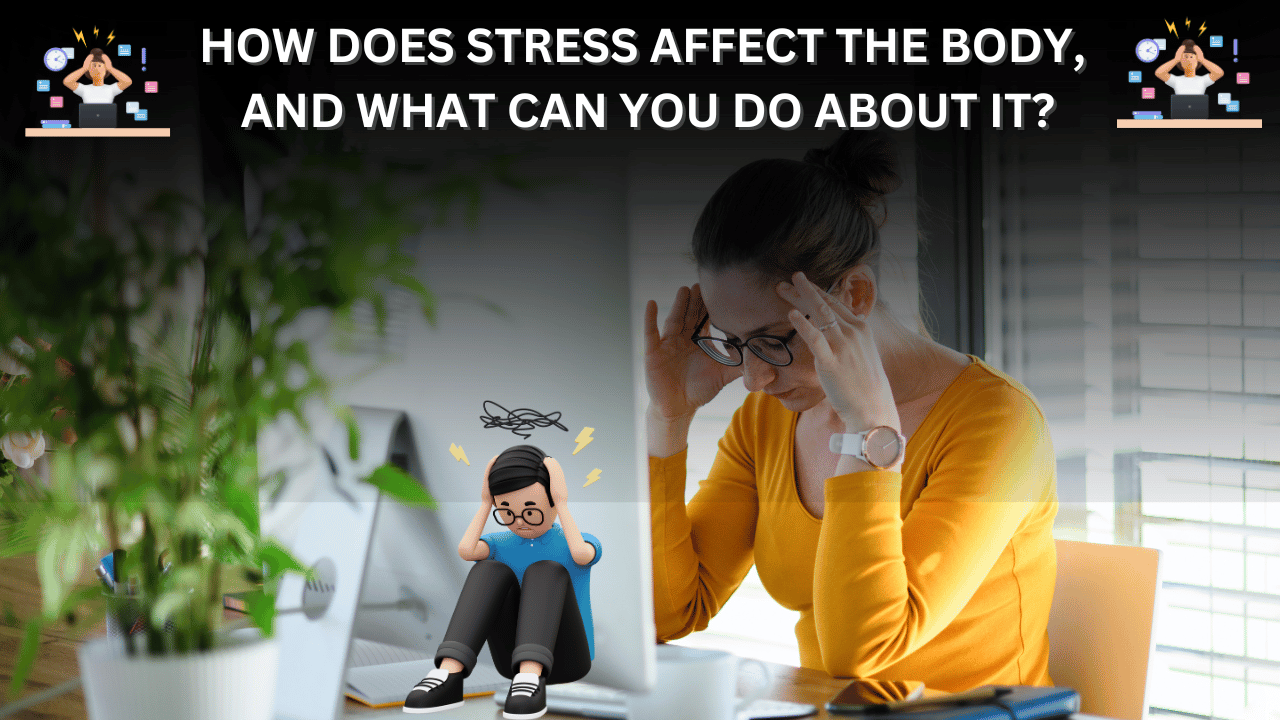
Stress can have a profound impact on the body, affecting both physical and mental health. Here’s how stress affects the body and what can be done to manage it:
How Stress Affects the Body:
- Physical Symptoms:
- Cardiovascular System: Stress causes the body to release stress hormones like adrenaline and cortisol, which increase heart rate and blood pressure. Over time, this can contribute to hypertension and an increased risk of heart disease.
- Immune System: Chronic stress suppresses the immune system, making the body more susceptible to illnesses. It can also slow down recovery times from illnesses and injuries.
- Muscular System: Stress causes muscles to tense up, which can lead to headaches, back pain, and other musculoskeletal problems. This tension can be long-lasting and contribute to chronic pain if not managed properly.
- Digestive System: Stress can disrupt normal digestion. It may lead to conditions such as acid reflux, irritable bowel syndrome (IBS), or stomach ulcers. Chronic stress can also alter eating habits, leading to overeating or poor nutrition.
- Endocrine System: Long-term stress can lead to hormonal imbalances, affecting everything from sleep to appetite regulation. Cortisol, in particular, is linked to weight gain, especially around the abdomen, and can impact blood sugar levels.
- Mental and Emotional Effects:
- Anxiety and Depression: Prolonged stress can contribute to mental health conditions such as anxiety and depression. The body’s ongoing stress response can alter brain function, leading to mood changes, irritability, and cognitive impairment.
- Cognitive Function: Chronic stress can impair memory, concentration, and decision-making. This can make everyday tasks more difficult and may reduce productivity at work or in personal life.
What You Can Do About It:
- Practice Relaxation Techniques:
- Mindfulness and Meditation: These practices help calm the mind and reduce the body’s stress response. Studies show that mindfulness can lower cortisol levels, improve focus, and enhance overall well-being.
- Deep Breathing Exercises: Simple breathing techniques, such as diaphragmatic breathing, can help activate the parasympathetic nervous system, which counters the stress response and promotes relaxation.
- Yoga and Tai Chi: These activities combine physical movement with mindful breathing, helping to reduce stress and improve flexibility and strength.
- Exercise Regularly:
- Physical activity increases endorphins, the body’s natural mood elevators, which can help reduce stress and improve overall health. Even simple exercises like walking or swimming can have a calming effect.
- Maintain a Healthy Lifestyle:
- Balanced Diet: Eating a nutritious diet with plenty of fruits, vegetables, whole grains, and lean proteins can help the body manage stress better. Avoiding excessive caffeine and sugar can prevent energy crashes that exacerbate stress.
- Adequate Sleep: Chronic stress often interferes with sleep, leading to a vicious cycle. Ensuring you get 7-9 hours of quality sleep each night can help the body recover from stress and improve mood and cognitive function.
- Social Support:
- Talking About Stress: Having a support network of family, friends, or a counselor to talk to can help reduce the emotional burden of stress. Sharing feelings and experiences can offer new perspectives and solutions.
- Engage in Social Activities: Participating in social activities you enjoy can provide a sense of belonging and help take your mind off stressful situations.
- Time Management:
- Prioritize Tasks: Organizing tasks and setting realistic deadlines can help prevent feelings of overwhelm. Breaking large tasks into smaller, manageable steps can reduce stress and improve productivity.
- Set Boundaries: Learning to say no when necessary and delegating tasks can help avoid overcommitting and reduce stress levels.
- Seek Professional Help:
- If stress becomes overwhelming, it’s important to seek help from a healthcare provider or therapist. Cognitive-behavioral therapy (CBT) is especially effective for stress management, helping individuals develop healthier coping mechanisms.
In summary, while stress is a natural response to challenges, chronic stress can have serious physical and mental health consequences. By practicing relaxation techniques, maintaining a healthy lifestyle, exercising, and seeking support, you can mitigate the negative effects of stress and improve your overall well-being.







